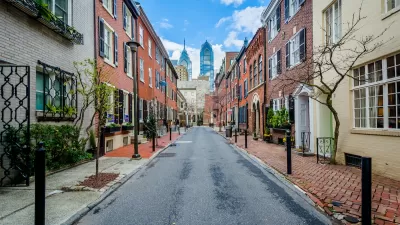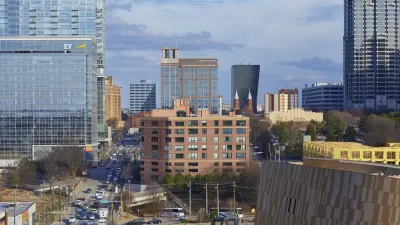Here are some observations that may shed light on the mystery of why—despite creating every incentive that planners can conceive—we are failing to produce affordable housing at the level we need.

It is often convenient to blame city planners for the affordable housing crisis. After all, those affected have no other public forum to vent their concerns, least of all toward those who are profiting off of the crisis on a project-by-project basis. Sadly, this blame is often misguided because planners do not produce housing.
A case study of the profit-maximizing, decision-making that is driving the affordability crisis is downtown San Diego. Construction cranes are up all over, and a $6.4 billion development juggernaut is rolling through. Nearly 10,000 new units have been permitted by the downtown planning board over the last four years, and the fast and generous permit approval process is cited as a model by developers for other regions. Underlying this process is a programmatic master plan that eliminates the need for project-level environmental review, lax standards on deviations from the zoning code, and a public hearing process that is limited to design review, often bypassing complex questions about density and community impacts. The process is overlaid with myriad incentives in the form of density bonuses for affordable housing and green building.
This kind of permit streamlining that supply-siders clamor for in state and local legislation for land-use planning and zoning reform is a developers’ dream come true. Yet, this same socially blind approach to planning has led to more affordable housing units being demolished than being built, and a 60 percent spike in unsheltered homeless downtown in the last two years.
FULL STORY: Making It Easier to Build Won’t Generate Affordable Units

Planetizen Federal Action Tracker
A weekly monitor of how Trump’s orders and actions are impacting planners and planning in America.

San Francisco's School District Spent $105M To Build Affordable Housing for Teachers — And That's Just the Beginning
SFUSD joins a growing list of school districts using their land holdings to address housing affordability challenges faced by their own employees.

The Tiny, Adorable $7,000 Car Turning Japan Onto EVs
The single seat Mibot charges from a regular plug as quickly as an iPad, and is about half the price of an average EV.

Seattle's Plan for Adopting Driverless Cars
Equity, safety, accessibility and affordability are front of mind as the city prepares for robotaxis and other autonomous vehicles.

As Trump Phases Out FEMA, Is It Time to Flee the Floodplains?
With less federal funding available for disaster relief efforts, the need to relocate at-risk communities is more urgent than ever.

With Protected Lanes, 460% More People Commute by Bike
For those needing more ammo, more data proving what we already knew is here.
Urban Design for Planners 1: Software Tools
This six-course series explores essential urban design concepts using open source software and equips planners with the tools they need to participate fully in the urban design process.
Planning for Universal Design
Learn the tools for implementing Universal Design in planning regulations.
Smith Gee Studio
City of Charlotte
City of Camden Redevelopment Agency
City of Astoria
Transportation Research & Education Center (TREC) at Portland State University
US High Speed Rail Association
City of Camden Redevelopment Agency
Municipality of Princeton (NJ)





























